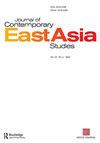“一带一路”倡议是在中国对外开放的背景下提出的
IF 1.4
Q1 AREA STUDIES
引用次数: 37
摘要
摘要【背景】:当前,中国经济发展模式由投资/出口导向型向消费/内需导向型转变。在面向国内发展的新阶段,中国对外开放政策的作用是什么?它不再只是获得外汇和技术的手段,而是中国作为一个经济超级大国加强其在全球治理中的作用。 [目的]:本文试图将“一带一路”倡议定位于中国对外开放政策中,重点关注其在主要国际经济体制全球治理中日益增长的作用。[主要论点]:本文由三部分组成。第一部分论述了中国对主要国际经济体制的回应。第二部分从中国对外开放政策的角度来思考“一带一路”倡议的宗旨和发展。第三部分考察了中国在“一带一路”倡议中的发展援助/金融,并以此为个案分析了中国对这类国际制度的态度。[结论]:就“一带一路”倡议中的发展援助/金融而言,中国形成以其为主导的经济区的行为是对现有国际经济体制的新挑战。然而,作为自由贸易体制的最大受益者,中国并不寻求对现行国际经济体制进行根本性重组。尝到自由贸易制度的果实,在后院形成经济主导区,这一定是中国最有利的局面。本文章由计算机程序翻译,如有差异,请以英文原文为准。
The Belt and Road Initiative (BRI) in the context of China’s opening-up policy
ABSTRACT [Background]: China’s economy currently shifts its development pattern from investment/export-led to consumption/domestic demand-led growth. In a new stage of domestic-oriented development, what role is expected of China’s opening-up policy? It is no longer just a means to obtain foreign currency and technology but for China as an economic superpower to enhance its role in global governance. The Belt and Road Initiative (BRI) proposed by General Secretary Xi Jinping in 2013 is regarded as a new grand strategy in a new stage of China’s opening-up policy. [Purpose]: This article attempts to position the BRI in China’s opening-up policy focusing on its growing role in global governance of major international economic regimes. [Main Argument]: This article consists of three parts. The first part deals with China’s responses to major international economic regimes. The second part considers the purpose and development of the BRI from a viewpoint of China’s opening-up policy. The third part investigates into China’s development aid/finance in the BRI as a case study of its attitude toward an international regime of this kind. [Conclusions]: As far as the development aid/finance in the BRI is concerned, China’s behavior to form an economic area led by it is a new challenge to existing international economic regimes. As the largest beneficiary of free trade system, however, China does not seek for fundamental restructuring of current international economic regimes. It must be the most favorable scenario for China to taste the fruits of free trade system and to form its dominant economic area in the backyard.
求助全文
通过发布文献求助,成功后即可免费获取论文全文。
去求助
来源期刊

Journal of Contemporary East Asia Studies
Social Sciences-Cultural Studies
CiteScore
2.50
自引率
0.00%
发文量
10
审稿时长
6 weeks
 求助内容:
求助内容: 应助结果提醒方式:
应助结果提醒方式:


